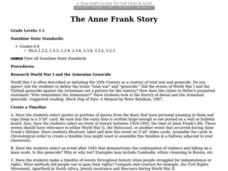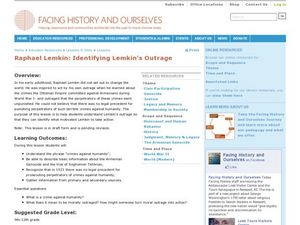Facing History and Ourselves
American Responses to the Armenian Genocide
Young scholars examine World War I war crimes. In this world history instructional activity, students use primary and secondary sources to research and understand the action taken by the United States during the Armenian Genocide. Young...
Curated OER
The Armenian Genocide: The American Ambassador in Constantinople
Students analyze America's reaction to the Armenian Genocide. They write a journal response, read and discuss text, compare/contrast reactions around the world to the Armenian Genocide and the genocide in Rwanda, and write an essay.
Curated OER
Armenian Genocide
As your historians examine the beginnings of WWI, ensure they are familiar with the Armenian Genocide. This basic introductory lesson plan utilizes teacher-led discussion, map analysis, and a Socratic seminar. Not much detail is offered...
Curated OER
The Roots of the Arab-Israeli Conflict: 1890s-1947
Consider and examine the roots of the Arab-Israeli conflict during the turn of the century. The topics covered in this presentation are not fully explained but are a perfect accompaniment to a full lecture. Issues to examine include The...
Curated OER
Genocides of the 20th Century
Ninth graders research the causes of the major genocides of the 20th century. They participate in a jigsaw activity and complete a concept map of different genocides, watch and discuss excerpts from the movies "Hotel Rwanda," "The...
Curated OER
1914-1918: The World at War
Thorough and engaging, this presentation details the causes and contexts of World War I on all fronts. It covers "the spark" that began it all, as well as the effect of technology on weaponry and the role of women on the home front and...
Facing History and Ourselves
We and They, the Armenians in the Ottoman Empire
Learners examine World War I war crimes. For this world history instructional activity, students use primary and secondary sources to research and understand the action taken by the United States during the Armenian Genocide. Learners...
Curated OER
The Anne Frank Story
What is genocide? Create timelines regarding the human genocide. Middle and high schoolers analyze information that requires them to consider links between Armenian genocide and the Holocaust. In groups, theydesign timelines that...
Facing History and Ourselves
What is Justice After Genocide?
High schoolers explore the meaning and implications of genocide. In this human rights lesson, students investigate the Aremenian genocide that took place in Turkey and the subsequent trials of the leader of the...
Facing History and Ourselves
Denial and Free Speech
Learners explore the meaning and implications of genocide. For this Armenian genocide activity, learners investigate the genocide that took place in Turkey.
Facing History and Ourselves
Analyzing Historical Evidence
High schoolers examine World War I war crimes. In this world history instructional activity, students use primary and secondary sources to research and understand the systematic nature of the Armenian Genocide. High schoolers reflect on...
Facing History and Ourselves
The Range of Choices
Learners examine crimes against human rights. In this world history instructional activity, students watch a segment of a video about the Armenian Genocide. Learners reflect on the crimes of the Ottoman government in classroom...
Facing History and Ourselves
Identity and Belonging
High schoolers examine World War I war crimes. For this world history activity, students examine a painting by Ashile Gorky, a refugee from the Armenian genocide. High schoolers interpret the piece of art and discuss its historical...
Curated OER
Genocide
Learners research acts of genocide to become aware that acts of genocide have been ongoing throughout history, and continue today. Students create a presentation including a verbal description of the situation, a written summary and a...
Mountain View High School
World War I Research Project
Here is a fantastic World War I research project that includes clear guidelines for topic choice, guiding questions, and suggested presentation products. Research subjects range from battles of the war, trench warfare, and weaponry, to...
Curated OER
Tolerance and Genocide
Students investigate the causes of genocide. In this cultural diversity instructional activity, students discuss genocide incidents in Africa, the Middle East, and Eastern Europe. Students then write essays about what they would do if...
Curated OER
Nation Building
Ninth graders examine the role of the United States in nation building. In this World History activity, 9th graders evaluate the role of the United States in building nations in other parts of the world.
Curated OER
Genocide in History
In this genocide in the 20th century study guide worksheet, students read the notes provided and add notes of their own.
Facing History and Ourselves
Raphael Lemkin: Identifying Lemkin's Outrage
Students examine World War I war crimes. For this world history lesson plan, students use primary and secondary sources to research Armenian genocide and the trial of Soghomon Tehlirin.
Facing History and Ourselves
Exploring Raphael Lemkin's Actions: The Invention of the Word "Genocide"
Learners examine the contributions of Raphael Lemkin. For this genocide activity, young scholars consider how Lemkin defined the atrocities of the Holocaust as he coined the term "genocide." Learners discuss the definition of genocide as...
Curated OER
Teaching About Genocide
Students can find that genocide is a prevalent theme in world history.
Curated OER
Stereotypes in The Diary of Anne Frank
Before reading Anne Frank's diary, discuss stereotypes with your class. This guide is a great prereading activity; pupils complete a list of incomplete sentences in order to showcase common stereotypes. Then, they complete the seven...
Curated OER
Becoming American: exploring Names and Identities
Tenth graders explore the links between one's name and his or her identity. In this World History instructional activity, 10th graders create a class identity chart. Students analyze quotes dealing with identity.
Curated OER
Interative History Notebook Mini-lesson
High schoolers respond to Holocaust literature. In this interactive history lesson, students select quotes from chapter 1 of Elie Wiesel's Night and reflect on their meaning as they record their thoughts on poetic, prose, comic. or...

























